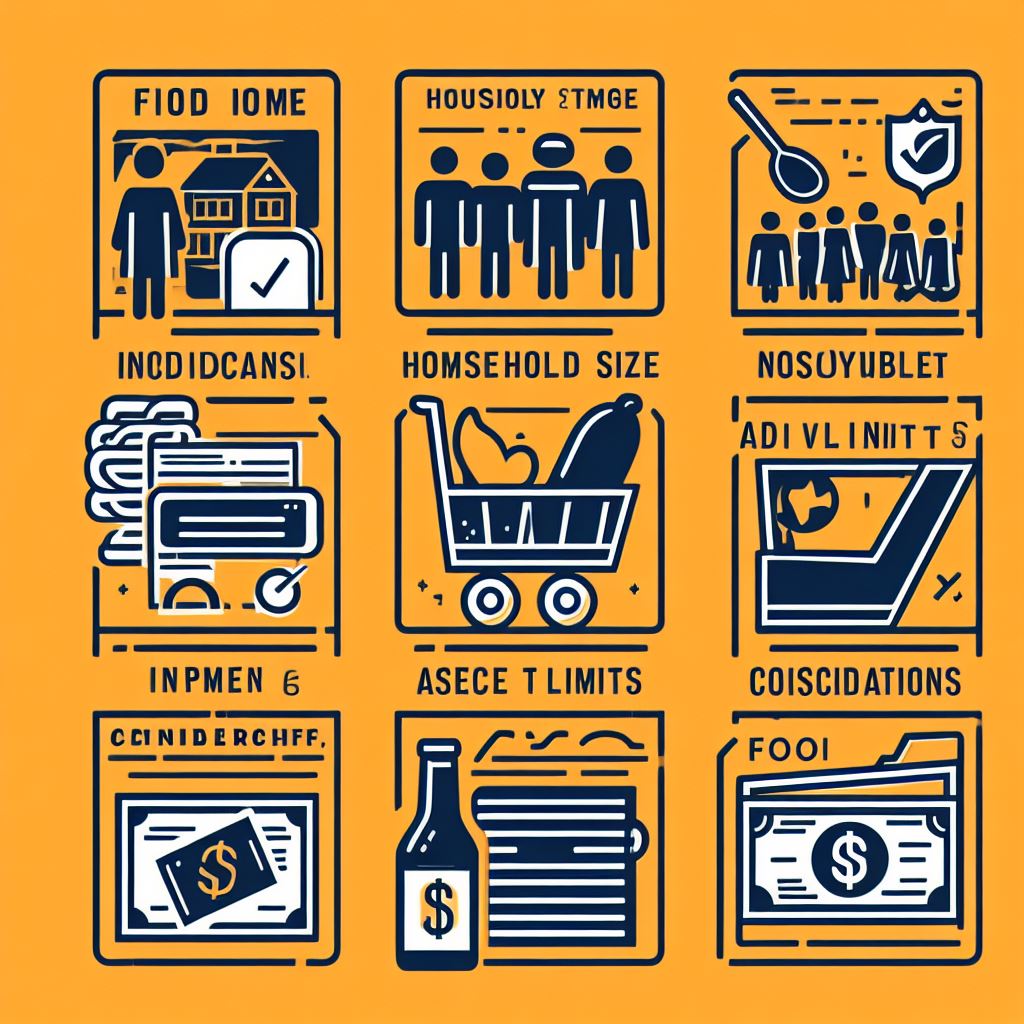6 Best Guidelines for Food Stamp Eligibility

Are you wondering if you qualify for food stamps?
Well, here’s a statistic for you: approximately 42 million Americans rely on the Supplemental Nutrition Assistance Program (SNAP) to put food on the table.
If you want to know if you meet the eligibility guidelines, look no further.
In this article, we’ll break down the six best guidelines for food stamp eligibility, including:
- Income limits
- Household size considerations
- Work requirements
- Citizenship and immigration status
- Asset limits
- Deductions and allowances.
Key Takeaways
- Income limits are determined by household size and state, and certain deductions can lower countable income for food stamp eligibility.
- Job search and active participation in job training programs are required, but exemptions exist for volunteer work or approved training programs.
- Various training program options, such as vocational training, educational programs, and apprenticeships, can help individuals meet work requirements.
- U.S. citizenship or qualified non-citizen status is required for food stamp eligibility, and documentation is necessary to prove citizenship or immigration status.
Income Limits
To determine if you qualify for food stamps, you need to meet the income limits set by the program. These income limits are crucial in determining your eligibility for assistance. The Supplemental Nutrition Assistance Program (SNAP), commonly known as food stamps, is designed to help low-income individuals and families afford nutritious food. The program takes into account your household size and income to determine if you meet the requirements.
The income limits vary depending on the state you live in and the number of people in your household. As a general guideline, for a household of one, the maximum gross monthly income is set at $1,383, while for a household of four, it’s $2,839. It’s important to note that gross income includes wages, self-employment income, and any other sources of income. However, certain deductions can be applied to your gross income, such as housing costs, dependent care expenses, and medical expenses, which can help lower your countable income.
To determine your eligibility, you’ll need to provide documentation of your income, expenses, and household composition. If your income is within the set limits, you may qualify for food stamps. It’s essential to stay informed about the income limits in your state and regularly review your eligibility, as they may change over time.
Household Size Considerations
When determining your eligibility for food stamps, it’s important to consider the size of your household. The number of people in your household directly affects the amount of income and resources that are taken into account when determining your eligibility for food stamps.
Here are three key considerations regarding household size:
- Number of People: The total number of individuals living in your household, including both adults and children, is a significant factor in determining your eligibility for food stamps. The more people in your household, the higher the income limit may be for you to qualify for assistance.
- Dependency Status: If you have dependents in your household, such as children or elderly relatives, this can also impact your eligibility for food stamps. The presence of dependents may lower the income limit, allowing you to qualify for assistance even if your household income exceeds the standard limit.
- Shared Expenses: If you share expenses with other individuals or families, such as living in a shared household or pooling resources with relatives, this can also affect your eligibility. In such cases, the income and resources of everyone involved may be considered collectively, potentially impacting your eligibility for food stamps.
Considering these factors related to household size is crucial when determining your eligibility for food stamps. It’s important to accurately report the number of individuals in your household and any relevant information regarding dependencies or shared expenses to ensure a fair assessment of your eligibility.
Work Requirements
When it comes to work requirements for food stamp eligibility, there are several key points to consider.
First, you must meet job search expectations, actively seeking employment and participating in job training programs when required.
However, there are exemptions for individuals engaged in volunteer work or enrolled in approved training programs.
Understanding these points will help you navigate the work requirements and ensure your eligibility for food stamps.
Job Search Expectations
You must actively search for employment to meet the work requirements for food stamp eligibility. Here are three important guidelines to follow:
- Document your job search efforts: Keep a record of the companies you’ve applied to, the dates of your applications, and any follow-up actions you’ve taken. This documentation will be necessary to demonstrate your compliance with the work requirements.
- Engage in regular job search activities: Dedicate a significant amount of time each week to searching for suitable employment opportunities. This can include browsing online job boards, attending job fairs, networking with professionals in your field, and reaching out to potential employers directly.
- Be proactive and persistent: Actively seek out employment opportunities that match your skills and qualifications. Don’t wait for jobs to come to you; instead, actively pursue positions that align with your interests and experience.
By following these guidelines, you can demonstrate your commitment to finding employment and meet the work requirements for food stamp eligibility.
Now, let’s explore the exemptions for volunteer work.
Volunteer Work Exemptions
Continuing the discussion from the previous subtopic, it is important to note that certain exemptions exist for volunteer work in meeting the work requirements for food stamp eligibility. These exemptions are designed to accommodate individuals who are unable to meet the work requirements due to various reasons such as disability, caregiving responsibilities, or participation in certain programs. The following table provides an overview of the volunteer work exemptions:
| Exemption | Eligibility Criteria |
|---|---|
| Disability | Individuals who are unable to work due to a physical or mental impairment that prevents them from engaging in substantial gainful activity. |
| Caregiving | Individuals who are responsible for the care of a child under the age of 6 or a disabled individual. |
| Education or Training | Individuals who are enrolled at least half-time in an approved education or training program. |
| Work Program Participants | Individuals who are participating in certain work programs, such as Workforce Innovation and Opportunity Act programs or the SNAP Employment and Training program. |
| Age | Individuals who are 60 years of age or older. |
These exemptions recognize that not everyone is able to fulfill the work requirements for food stamp eligibility and provide necessary support for those who fall under these categories.
Training Program Options
To meet the work requirements for food stamp eligibility, you have various training program options available. These programs aim to equip you with the necessary skills and qualifications to secure employment and become self-sufficient.
Consider the following options:
- Job Training Programs: These programs provide vocational training in specific industries or occupations. They offer hands-on experience and instruction to help you develop the skills needed for employment.
- Educational Programs: Pursuing education through community colleges, technical schools, or online courses can enhance your job prospects. These programs offer a range of certifications, diplomas, and degrees that can make you more competitive in the job market.
- Apprenticeships: Apprenticeships combine on-the-job training with classroom instruction. They allow you to earn a wage while learning a trade or profession under the guidance of experienced mentors.
Citizenship and Immigration Status
To determine your eligibility for food stamps, it’s important to understand the requirements regarding your citizenship and immigration status.
In order to qualify for food stamps, you must be a U.S. citizen or a qualified non-citizen. U.S. citizens are automatically eligible for food stamps, while qualified non-citizens include lawful permanent residents, refugees, asylees, and certain other immigrant categories. However, undocumented immigrants are generally not eligible for food stamps.
To prove your citizenship or immigration status, you’ll need to provide documentation such as a birth certificate, U.S. passport, or immigration papers. It’s crucial to have these documents ready when applying for food stamps to avoid any delays or complications in the process.
It is important to note that if you’re an eligible non-citizen, you may still need to meet other eligibility requirements, such as income and resource limits. These requirements can vary depending on your state of residence, so it’s recommended to check with your local SNAP (Supplemental Nutrition Assistance Program) office for specific guidelines.
Understanding the requirements regarding your citizenship and immigration status is essential when applying for food stamps. Once you have determined your eligibility based on these criteria, you can then move on to the next step: assessing your asset limits.
Asset Limits
After establishing your citizenship and immigration status, it’s now time to consider the asset limits for food stamp eligibility. To determine if you’re eligible for food stamps, you must meet certain asset limits. These limits are in place to ensure that the program reaches those who truly need assistance.
Here are three important things you need to know about asset limits:
- Cash and Bank Accounts: The total value of your cash on hand and in bank accounts mustn’t exceed the asset limit set by the food stamp program. It’s important to accurately report the amount of cash and the value of your bank accounts when applying for food stamps.
- Vehicles: The value of your vehicle is also taken into consideration when determining your eligibility for food stamps. Generally, if the total value of your vehicles exceeds the asset limit, you may not be eligible for food stamp benefits. However, certain exemptions may apply, such as vehicles used for work or education.
- Other Assets: Besides cash, bank accounts, and vehicles, the food stamp program also considers other assets, such as property and investments. It’s essential to provide accurate information about these assets to determine your eligibility.
Understanding the asset limits for food stamp eligibility is crucial in determining your eligibility for assistance. Once you have a clear understanding of these limits, you can move on to the next step, which is deductions and allowances.
Deductions and Allowances
Let’s talk about deductions and allowances when it comes to food stamp eligibility.
Income deductions can help lower your countable income and increase your chances of qualifying. It’s important to understand which expenses are eligible for deductions and how they can impact your overall eligibility for food stamps.
Income Deductions Explained
You can understand income deductions for food stamp eligibility by familiarizing yourself with the deductions and allowances available. Here are three key things to know about income deductions:
- Standard Deduction: This is a fixed deduction amount that’s subtracted from your gross income. It varies based on your household size. The higher your household size, the higher the standard deduction.
- Earned Income Deduction: If you have earnings from work, you can deduct a certain amount from your gross income. This deduction is designed to encourage and support employment.
- Dependent Care Deduction: If you have dependent care expenses, such as childcare or care for a disabled family member, you may be eligible for this deduction. It allows you to subtract a portion of these expenses from your gross income.
Eligible Expense Allowances
To continue understanding food stamp eligibility, it’s important to delve into the topic of eligible expense allowances, which include deductions and allowances for various expenses.
These allowances help determine the amount of income counted when determining your eligibility for food stamps.
Some common deductions and allowances include shelter costs, such as rent or mortgage payments, utility bills, and property taxes.
Additionally, you may be eligible for deductions related to medical expenses, dependent care expenses, and child support payments.
It’s crucial to keep accurate records of these expenses and provide supporting documentation when applying for food stamps.
Impact of Deductions
Continuing from the previous subtopic, deductions and allowances have a significant impact on determining your food stamp eligibility. Understanding how these deductions work is crucial to accurately assess your eligibility. Here are three key points to consider:
- Standard Deductions: Food stamp programs allow for a standard deduction, which is a fixed amount subtracted from your income before determining eligibility. This deduction helps ensure that low-income individuals and families receive the support they need.
- Shelter Deduction: If you have high housing costs, you may be eligible for a shelter deduction. This deduction considers a portion of your housing expenses, such as rent or mortgage payments, utilities, and property taxes. It can significantly lower your countable income and increase your chances of qualifying for food stamps.
- Medical Expense Deduction: Certain medical expenses, such as prescription medications, doctor visits, and transportation costs to medical appointments, can be deducted from your income. These deductions are especially beneficial for individuals with high medical expenses, as they can reduce their countable income and increase their eligibility for food stamps.
Frequently Asked Questions
Can I Apply for Food Stamps if I Am Currently Unemployed?
Yes, you can apply for food stamps if you are currently unemployed. The eligibility for food stamps is based on your income and household size, not your employment status.
Are There Any Special Considerations for Individuals With Disabilities When It Comes to Food Stamp Eligibility?
Yes, there are special considerations for individuals with disabilities when it comes to food stamp eligibility. The guidelines take into account factors such as income, resources, and the ability to work.
Can College Students Qualify for Food Stamps?
Yes, college students can qualify for food stamps if they meet certain criteria. However, without knowing the specific guidelines, it is important to consult the official guidelines to determine eligibility.
What Happens if My Income Fluctuates From Month to Month? Will It Affect My Eligibility?
If your income fluctuates from month to month, it may affect your eligibility for food stamps. The guidelines for eligibility are based on your income and other factors, so changes in income could impact your eligibility status.
Are There Any Restrictions on the Types of Food Items That Can Be Purchased Using Food Stamps?
Yes, there are restrictions on the types of food items you can purchase with food stamps. The guidelines outline what is considered eligible, ensuring that the program supports nutritious and essential food choices.



